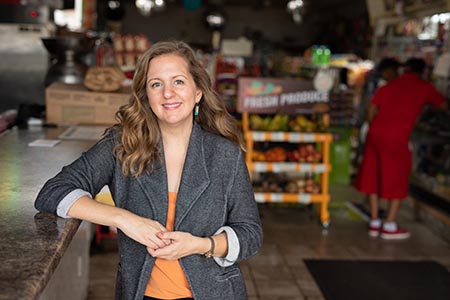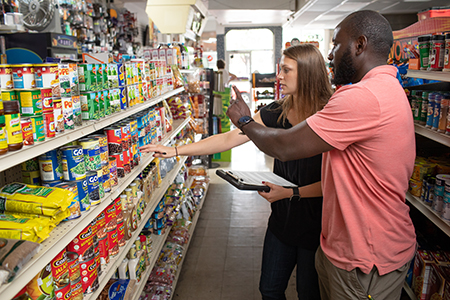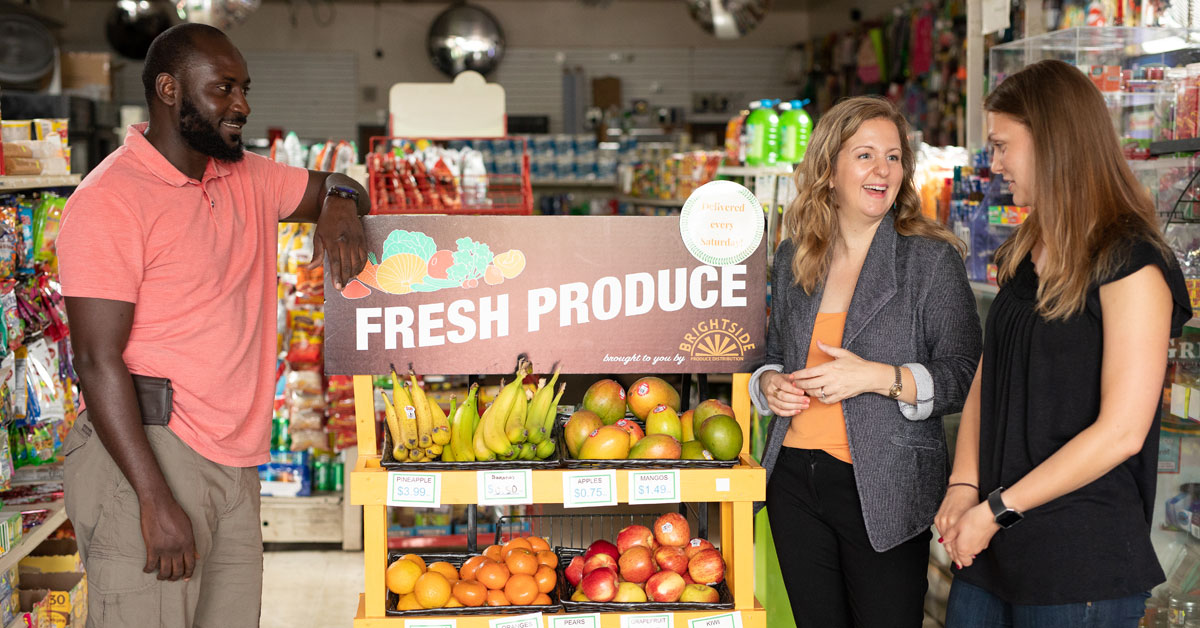U.S. News and World Report ranks Minneapolis among the top ten most livable cities in the country, praising its parks, green spaces, and bike paths, as well as its art, music, and restaurant scene. Yet, one-quarter of the city, North Minneapolis [also known as the Northside], is saturated with fast food franchises and convenience stores with few, if any, fully stocked grocery stores. Here, as in neighborhoods across the country, approximately 30 percent of the residents lack easy access to healthy food and 1-in-3 people suffer from type 2 diabetes. The relationship between a lack of healthy food access and obesity and chronic illness is clear.
Tasha Powell, co-founder of Appetite for Change, a social enterprise that uses food as a tool for building health, prosperity, and social change in North Minneapolis, grew up on the Northside and remembers a time when the area had healthier choices. “We want better quality food in our groceries and restaurants again. And we want community ownership at every level of our food system,” she says. “People on the Northside want to eat good food and we’re interested in new ways to cook that food.”

In 2008, when Minneapolis decided to tackle the scarcity of healthy foods in some Minneapolis neighborhoods, it called on the research of Melissa Laska, a professor at the University of Minnesota School of Public Health (SPH) and a national expert on the relationship between food and health. Relying on her evidence-based work, Minneapolis forged and passed the Staple Foods Ordinance.
This ground-breaking piece of legislation is the first in the country to require licensed grocery stores — including corner stores, dollar stores, gas stations, and pharmacies — to display and sell high quality fresh produce and other whole foods. The ordinance was amended by the City Council in 2014 with more comprehensive standards tied to WIC (Special Supplemental Nutrition for Women, Infants and Children) requirements. “The city’s position is that if you’re going to be licensed as a food store, you have to sell real food,” says Robin Garwood, a city policy aide.
“Cities across the country are looking to Minneapolis as an inspiration and a trailblazer [to create healthier food environments].”
To evaluate the impact of this ordinance, the city and the Minneapolis Health Department (MHD) is partnering with Laska and SPH in a multi-year research study called STORE (Staple Foods Ordinance Evaluation Study) to measure changes in how a store purchases and markets fresh food; assess shoppers’ buying habits; and audit the food choices in the homes of willing shoppers. The National Institutes of Health and the Centers for Disease Control and Prevention are funding this work.
“Minneapolis is the first U.S. city to have a policy of this kind, so it’s important to understand what is working and where the holes are,” Laska says. “Cities across the country are looking to Minneapolis as an inspiration and a trailblazer [to create healthier food environments].”

Laska’s work entails far more than collecting data and crunching numbers — she is forging important connections among community members, MHD, the School of Public Health, store owners, the city of Minneapolis, and fledgling organizations to transform the food environment on the Northside. For example, she supported the Northside Fresh Coalition — a network of more than 60 community members, organizations, and businesses committed to building a more self-reliant, just, and connected food system on the Northside — in obtaining a grant from the University’s Healthy Food Healthy Lives Institute. The grant will fund the Coalition’s work with retailers to create an incentive program for shoppers who buy fresh, healthy produce from corner stores.
When STORE and MHD found that store owners — unable to meet the quantity requirements for wholesale purchases — bought produce from Target or Walmart and marked it up for sale, the city helped connect them to the West Broadway Farmers Market and to BrightSide, a non-profit produce distributor.
“Those connections have been very helpful,” says Ousman Camara of K’s Grocery and Deli on West Broadway. “I now host Fresh Saturdays when BrightSide delivers and I set the produce out at the front of the store to draw people in; people can find good looking, good tasting fruits and vegetables and this helps generate sales.” Tobie, a neighborhood resident and regular shopper, comments, “When it’s here, I’ll buy it.”

School of Public Health students are also deeply involved in the work of the food systems change Laska leads. When research showed that retailers needed help complying with the Staple Foods Ordinance early on, MHD initiated the Healthy Corner Stores program in 2010. As part of that program, several SPH students surveyed stores and, based on their findings, MHD provided marketing and merchandising materials, as well as funds for coolers and display racks to help stores be successful.
This summer, Kirsten Arm, an SPH second-year student and research assistant for Laska, is working with the health department to complete another round of compliance checks and provide stores with information on technical assistance, education, and resources. Her findings will help the city refine the ordinance to meet specific neighborhood needs. “In some areas, dairy products — milk and cheese — are not part of a culture’s diet,” Arm says. Minneapolis and the health department are now working to broaden the list of required foods to offer other choices that are nutritionally sound and culturally appropriate.
“We want better quality food in our groceries and restaurants again. And we want community ownership at every level of our food system,” says Tasha Powell, co-founder of Appetite for Change. “People on the Northside want to eat good food and we’re interested in new ways to cook that food.”
Laska understands that the ordinance is no magic bullet, and that change can only come by listening to the community and understanding its needs.
“Most neighborhood store owners don’t like selling cigarettes and junk food,” she says. “But they’re also business people, and they face stocking allotments from Pepsi and Coke to give chips and sodas preferential placement. And it’s also hard for a shopper, surrounded by that cheap, brightly packaged food, to make healthy choices.”
Michelle Horowitz, also a co-founder of Appetite for Change, has noticed Laska’s community engagement. “I’ve been impressed by Melissa’s intention to make this research deep and meaningful and to share the insights she’s gleaned,” she says. “She understands the power dynamic of privilege; she’s respectful and collaborative; and has built meaningful and lasting relationships that are critically important and take time and patience.”
Laska’s work offers students meaningful experiences in data collection, protocol, standards of research, as well as valuable life-long lessons in citizenship. Consider that less than a generation ago in currently under-served urban areas like North Minneapolis, you’d find butchers, green grocers, and bakeries where residents shopped for healthy food. Now, SPH professors and students and the city of Minneapolis are patiently and persistently supporting community allies in forging real, positive changes for decades to come.
Kirsten Arm’s graduate education is enhanced by the Public Health Fund, one of many giving opportunities in the SPH capital campaign, Driven: Shaping a Future of Health.

